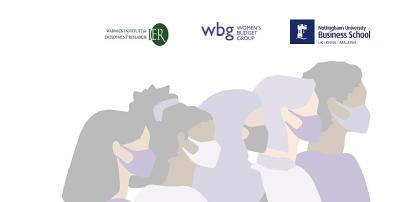IER News & blogs
COVID-19 and Working Lives in the UK: Inequalities of Gender and Class
 A webinar is being held on June 18th to showcase the findings of three new research projects.
A webinar is being held on June 18th to showcase the findings of three new research projects.
In the first of these projects, Clare Lyonette from IER has been working with Professor Tracey Warren at the University of Nottingham and the Women's Budget Group to examine the specific impact of Covid-19 on working class women, funded by the ESRC.
As well as presentations from the three projects, the webinar will host a panel of academic and policy-focused discussants, including Mandu Reid from the Women's Equality Party and Nikki Pound from the TUC.
For more details about the event and registration read here.
Employment entry and exit by women in India - blog by Soham Sahoo* and Sudipa Sarkar
 While India’s low female labour force participation has been studied extensively in the recent literature, an aspect that has received insufficient attention is the dynamic nature of employment – that is, individuals enter and exit the workforce at various points in time.
While India’s low female labour force participation has been studied extensively in the recent literature, an aspect that has received insufficient attention is the dynamic nature of employment – that is, individuals enter and exit the workforce at various points in time.
Analysing India Human Development Survey data from 2004-05 and 2011-12, this article shows that women have lower entry rates and higher exit rates vis-à-vis men, both in the short and long term. Read more in this blog, published in Ideas for India, here.
* Soham Sahoo, Assistant Professor, Indian Institute of Management Bangalore
The cumulative burden of housework, childcare, home-schooling and paid employment during the pandemic is having a disproportionate impact on women’s psychological wellbeing
 New research is being conducted by Professor Tracey Warren at the University of Nottingham and Professor Clare Lyonette at IER, with the Women’s Budget Group. Latest findings, reported in the Telegraph, suggest that the cumulative burden of housework, childcare, home-schooling and paid employment during the pandemic is having a disproportionate impact on women’s psychological wellbeing.
New research is being conducted by Professor Tracey Warren at the University of Nottingham and Professor Clare Lyonette at IER, with the Women’s Budget Group. Latest findings, reported in the Telegraph, suggest that the cumulative burden of housework, childcare, home-schooling and paid employment during the pandemic is having a disproportionate impact on women’s psychological wellbeing.
During lockdown, 70% of employed women living in couples reported bearing the main responsibility for washing/ironing (13% of men). Far more working mothers than fathers had main responsibility for childcare and 59% of employed mothers reported having main responsibility for additional home-schooling (9% of men). Women’s paid work has also been affected. More women than men are keyworkers, highest among working-class women, and a much higher proportion of female keyworkers are in frontline roles involving face-to-face interaction, putting both themselves and their families at risk, e.g. Health and social care; Education and child-care. Other women, especially working class women, have been furloughed, raising the risk of later job losses. Perhaps unsurprisingly, women's psychological wellbeing has been badly impacted, with working class women most likely to be psychologically distressed.
Listen to Clare Lyonette talking about her new project assessing the Covid-19 related burden on working-class women
 Professor Clare Lyonette was interviewed on BBC Radio Nottingham on Thursday July 16th about her new UKRI-funded project 'Carrying the work burden of the Covid-19 pandemic: working class women in the UK'. Listen to the interview here, starting at around 11.20 am.
Professor Clare Lyonette was interviewed on BBC Radio Nottingham on Thursday July 16th about her new UKRI-funded project 'Carrying the work burden of the Covid-19 pandemic: working class women in the UK'. Listen to the interview here, starting at around 11.20 am.
The project, led by Professor Tracey Warren from the University of Nottingham, in collaboration with Professor Clare Lyonette and the Women's Budget Group is being funded under the Covid-19 programme. Using new Covid-related questions from the UK Household Longitudinal Study, the research will assess how working-class women, who already juggle paid employment with the bulk of housework and childcare responsibilities, have been affected by the additional pressures of increased demands, both at home and at work. Read more in the University of Warwick press release here.
Key professions losing staff due to lack of support for student mothers
 Key professions such as nursing, teaching and social work are losing thousands of potential recruits as student mothers drop out of higher education due to a lack of support from universities. New research led by IER's Dr Clare Lyonette is published today. The research, funded by the Nuffield Foundation, highlights the true scale of the pressures placed upon mothers who go to university and calls for more to be done to assist them. Read more about the project and download the reports here.
Key professions such as nursing, teaching and social work are losing thousands of potential recruits as student mothers drop out of higher education due to a lack of support from universities. New research led by IER's Dr Clare Lyonette is published today. The research, funded by the Nuffield Foundation, highlights the true scale of the pressures placed upon mothers who go to university and calls for more to be done to assist them. Read more about the project and download the reports here.
